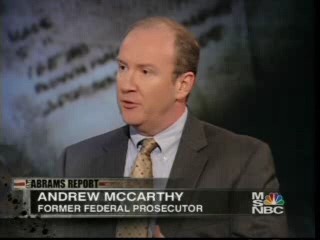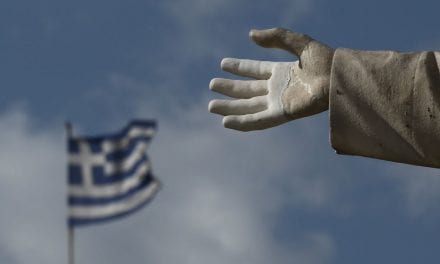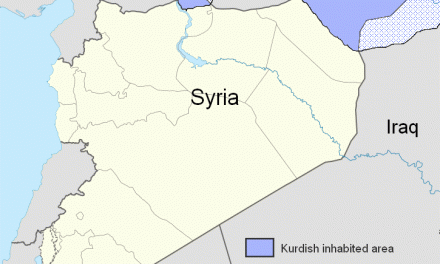By Jamie Glazov, Frontpage Magazine’s editor .
Frontpage Interview’s guest today is Andrew C. McCarthy, a senior fellow at the National Review Institute and a columnist for National Review. His book Willful Blindness: A Memoir of the Jihad (Encounter Books, 2008), has just been released in paperback with a new preface. Check out a description from Encounter Books.

FP: Andy McCarthy, welcome to Frontpage Interview.
I would like to talk to you today about Scott Brown’s victory in Massachusetts and how it was the issue of national-security that put Brown over Coakley.
Can you talk a bit about that? The people seemed to have cared about terrorism and the treatment of enemy combatants, yes?
McCarthy: Jamie, great to be here as always. And you’re right. The Brown campaign’s internal polling told them something very interesting. While it’s true that healthcare is what nationalized the election and riveted everyone’s attention to it, it was the national security issues that put real distance between the two candidates in the mind of the electorate-in blue Massachusetts of all places. Sen.-elect Brown was able to speak forcefully and convincingly on issues like treating our jihadist enemies as combatants rather than mere defendants, about killing terrorists and preventing terrorism rather than contenting ourselves with prosecutions after Americans have been killed, about tough interrogation when necessary to save innocent lives. Martha Coakley, by contrast, had to try to defend the indefensible, which is Obama-style counterterrorism. It evidently made a huge difference to voters.
FP: What do you think of how Bush was treated on this whole issue?
McCarthy: As many of us predicted during the Bush years when the president was being hammered by the Left and the press, history is treating him much more kindly on the national security front. His movement of the country to a war-footing rather than treating international terrorism as a criminal justice matter was common sense, but common sense cuts against the Washington grain so it took a strong president to do it. Now, on issue after issue, he is being vindicated-he and Vice President Cheney, who has become the country’s leading voice on national security, after spending years being vilified.
FP: What role did McCain play?
McCarthy: Sen. McCain is, as ever, a mixed bag. He’s recently been very good on the need to treat the enemy as an enemy, not as a defendant. So that was helpful to Brown. But it can’t be forgotten that McCain was the force behind the libel of Bush as a torture monger and the consequent ruination of our interrogation policy. And it was the “McCain Amendment” that gave us, as a matter of law, the extension of Fifth Amendment rights to our enemies overseas, which has had awful ramifications even outside the issue of interrogation practices. McCain is responsible for a lot of the fodder that made Obama possible.
FP: What lessons should Republicans take from Brown’s success?
McCarthy: These national security positions resonate with voters. Healthcare, TARP, and the economic issues in general are very important, but they’re complex and make people’s eyes glaze over sometimes. The national defense issues, besides being the most important ones confronted by a political community, are comparatively easy to wrap your brain around. And strong, unapologetic national defense in a time of terrorist threat is appealing to voters. So we should be arguing these issues forcefully, and not worry about the fact that the left-wing legacy media will say nasty things about us. Their instinctive America-bashing is why they are speaking to-or, better, speaking at-a steadily decreasing audience.
FP: The Left pretends that its positions in how to confront terror (or not to) are somehow founded on the Constitution. What’s the mindset here?
McCarthy: Yes, because they reject the foundational fact that the Constitution is a compact between the American people and the government they created. They think every person on planet earth is an American waiting to happen, born with the full panoply of American constitutional rights that can be asserted against the American people. And they think the courts, rather than being a peer branch of our government, stand over and above our government: a forum where the rest of the world, including enemies of the United States, is invited to make its case against the United States. That’s a warped understanding of the Constitution.
FP: What hope does Brown’s victory give? What do you think Obama, Holder and Napolitano are thinking – or not thinking?
McCarthy: Well, I think it’s Brown combined with what’s happened in New Jersey and Virginia, with Obama’s plunging numbers, the unpopularity of the Democrats’ healthcare, employment and national-security policies, and the disgusting wheeling-and-dealing the supposedly “transparent” Left is doing behind close doors (i.e., not on C-SPAN). All these things give hope that freedom is on the march, that people are broadly rejecting statism. But I don’t think Obama is a normal politician and that his administration is a conventional “let’s modulate to remain viable” administration.
Enacting their agenda is more important to them than being reelected, and they are not to be underestimated.
FP: Why do you think that when I see or think about Janet Napolitano I am engulfed with a profound sense of doom and despair?
McCarthy: Well, if I have this right, she is an official who is in charge of securing the homeland but – after ballyhooed, years-long investigations, including by the 9/11 Commissions – she didn’t know how the 9/11 hijackers got here, thought they snuck in from Canada, and believes that what they did when they got here was a “man-caused disaster” that had nothing to do with jihadist ideology (indeed, she thinks that saying “jihadist” is problematic). She does see ideology as a problem, of course, but only if it is … conservative ideology. That is, she thinks the real terror threat comes from people with radical ideas like limited government, the sanctity of life, and the Second Amendment – especially if they’re military vets who’ve served in George Bush’s wars of aggression. And she is in charge of enforcing the immigration laws but wasn’t aware that entering the country illegally is a criminal offense.
I can’t imagine why you’d have a problem with any of that, Jamie.
FP: Who needs horror movies or a tragic film to make you cry when you have things like this to think about?
Well, let’s move on:
What was this whole thing about Brown’s pick-up truck and Obama making fun of it? I thought Obama represented the common man?
McCarthy: This president has lived a very different kind of life from most Americans. He lived his early, formative years in Indonesia, a majority-Muslim police state. After he returned to America at age ten or so, he dove into the fever-swamps of the Left and was steeped in the cynicism and nihilism of Saul Alinsky. For years, he’s surrounded himself with fawning sycophants who’ve told him he’s “The One.” And he’s extremely insulated from the real world of everyday Americans. I don’t think the sudden burst of Obama-style populism is going to fly – and going after Brown’s pick-up is a good indication of why. He thinks people who like their pick-up trucks are bitter-clingers. Actually, they’re Americans.
FP: Brown vs. Obama, 2012?
McCarthy: I don’t think we should get ahead of ourselves. Brown’s an impressive, talented guy, but he’s also someone no one outside of Massachusetts had heard of until a few short weeks ago. But this does underscore something I’ve been saying for a long time. As late as 1991, few people really knew who Bill and Hillary Clinton were, and yet they’ve towered over our politics from 1992 forward. The world changed on a dime on 9/11.
A year ago today, with Pres. Obama just inaugurated and with the Democrats having wide margins in Congress, the Republican party seemed dead and even conservative intellectuals were telling us we had to abandon Reagan conservatism-the conservatism that’s leading us out of the woods. This is all a long-winded way of saying: We may not yet know, even today, who the leaders will be when 2012 rolls around. We’ve got a ton on our plate right now, and the unknown tomorrow. You know the old saw, “You want to make God laugh-tell Him about your plans.” Right now, I’m worried about today, and content to figure 2012 will take care of itself.
FP: Well before we say goodbye for now, what is on your mind the most right now? What can you tell our readers that will give us all some hope that America, despite its current leadership, can prevail against the threats it faces?
McCarthy: After slumbering for too long, the public – the great swath of Americans that is basically conservative, patriotic, and thinks the country is the best the world has ever known, not in dire need of transformative “change” – has asserted itself. But even if he’s held to one term, Obama will leave us in a deep hole. The reckless borrowing and spending would take decades to dig out of even if we stopped it tomorrow. There is a lot of mischief a sprawling executive bureaucracy can do in four years, and Obama is likely to stock the federal courts with very left-wing judges who will try to impose transnational progressivism by fiat if the Republicans don’t have the gumption to stop the president from appointing them. And that last point is what I think about most.
The challenge for Republicans is not to win the next elections. The smart Democrats have already factored elections in. Obama Leftists are not conventional politicians. They are true-believers. Of course they hope their friends at ACORN and similar outfits will soften the blow come November. But if not, they are willing to endure electoral losses for what they see as the greater good of using this one-time opportunity they have to transform this country radically.
Republicans don’t so much need a plan to win elections – the Democrats’ statist policies and their irresponsible positions on national security will take care of that. Stopping bad government is not enough. Republicans need a plan, after they win elections, to roll back what the Left has done and is doing. That will require courage and skill. I hope we have it, but I confess to worrying about whether we do.
FP: Andy McCarthy, thank you, and a pleasure and honor as always to speak with you.



















